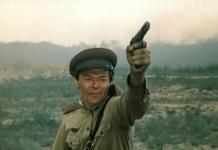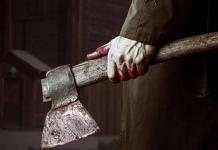Y. Bondarev - the story "Battalions ask for fire." In the story “Battalions ask for fire”, the writer shows what an inhuman cost we got the victory. In the center of the story is the fate of two battalions. Two battalions under the command of Major Bulbanyuk and Captain Maksimov were to cross the Dnieper, create a bridgehead near the village of Zolotushino and in the forestry area for the subsequent development of the division's offensive. The battalions were ordered to start a fight, then give a signal to the division - "we ask for fire." After that, divisional artillery was supposed to strike at the enemy. To support the battalions during the battle, two guns were allocated under the command of Captain Ermakov and a battery of Lieutenant Zharov.
However, in the course of hostilities, the plans of the command changed. The division, which was supposed to support the battalions with fire, was ordered to withdraw from combat positions and link up with another division. As a result, the division commander, Colonel Iverzev, recalls all regiments, leaving the battalions without fire support, which dooms them to certain death. The battalions signal for fire support, but it does not come. Captain Ermakov joins with Bulbanyuk's battalion, who was seriously wounded. Together with senior lieutenant Orlov, Ermakov takes command of the battalion. Soon everyone understands that the battalion is doomed. Orlov and part of the fighters die. Ermakov takes out his people, the survivors, from the encirclement.
In the second part of the story, we see a number of excellently written battle scenes, interspersed with an analysis of the state of mind of the characters. “I tried to create a picture of the battle from the various sensations of the characters in the story,” the author notes. “To show how people fought and died with different moods and at the most crucial moment of the test of courage.” And the writer was able to achieve his goal. So Orlov gives the order to the machine gunner to change position more often, he screams, his voice breaks, then he lies down behind an anti-tank rifle, misses three times, returns a soldier trying to get out of the trenches. Here Zhora Vitkovsky destroys the German infantry from a captured machine gun, a young lieutenant Yeroshin hurries to help the remnants of the battalion, but dies under air bombardment.
Captain Ermakov blames himself for the death of his soldiers: “I commanded a battalion and was left alone. Isn't that death? So why am I still alive when everyone is dead?” Ermakov also considers Colonel Iverzev, the division commander, to be guilty of the death of the battalion. And he blames the commander for the death of people. Iverzev in the novel thinks about the fate of the entire operation, Ermakov - about specific people. Thus, Y. Bondarev touches upon the most important social and moral problem in the story - the relationship between the norms of law and morality. And the author does not have a definite answer to this question. It kind of invites the reader to think.
Both of these images (Captain Ermakov and Divisional Commander Iverzev) are written out in the story in close-up. Captain Ermakov is a courageous man, decisive, straightforward, practically not inclined to reflection. He throws the accusation in the face of the division commander, not thinking about the consequences. This is what his conscience, the concept of officer honor, tells him to do. And he gets arrested. Then he is released, presented for a reward. However, the image of Colonel Iverzev in the story is quite complicated. At first glance, he seems to be a sharp, tough person. The author conveys this already in the very portrait of the hero. “Colonel Iverzev, ruddy, fair-haired, with cold blue eyes, dressed in a beautifully tailored steel-colored tunic, looked firmly and hard at Boris and said in a juicy voice: You are late, Captain Yermakov!
Listening to the division commander, Yermakov drew attention to his hand, clenched into a fist, and thought that “this fist is mercilessly strong, power-hungry, unyielding ...” The division commander Iverzev knows that he is right, because he figured out the enemy’s plan and thwarted it. But when he is left alone with himself, this consciousness of his own rightness does not save him from painful thoughts, reproaches of conscience. After seeing off Gulyaev and Yermakov, he, "pale, as if flabby at once," walks around the room, "squeezing his trembling fingers behind his back." "Pinning, almost physical pain" does not leave him. Ermakov's feelings and thoughts are clear to him. “Behind this officer stood his own truth, the truth of responsibility for the death of the battalion, behind him, Iverzev, there was an even greater truth - responsibility for the entire division.” At the end of the novel, Iverzev raises the soldiers to attack, is wounded in the arm, then he asks to present the dead and surviving soldiers, including Captain Ermakov, for a reward.
Thus, Y. Bondarev's approach to the depiction of a man in war, his perception of it from the inside, was determined in the story: through the eyes, mind, heart of a soldier shooting from a machine gun. This is a person passing, in the words of the author, "a test of humanity through a trial by fire." All the characters in the story go through this test, the war becomes a test of the moral qualities of a person.
Searched here:
- battalions ask for fire summary
- cooper battalions ask for fire summary
- battalions ask for fire summary by chapter
Description of the presentation on individual slides:
1 slide
Description of the slide:
2 slide
Description of the slide:
Yuri Bondarev (born March 15, 1924) Born on March 15, 1924 in the city of Orsk, Orenburg Region, in the family of Vasily Vasilyevich Bondarev (1896-1988), people's investigator, and Claudia Iosifovna Bondareva (1900-1978). In 1931 they moved to Moscow. Member of the Great Patriotic War (since August 1942), junior lieutenant. He graduated from the Chkalov Artillery School and the Literary Institute. A. M. Gorky (1951).
3 slide
Description of the slide:
Works: Debuted in print in 1949. The first collection of short stories "On the Big River" was published in 1953. Author of short stories (collection "Late Evening", 1962), novels "Youth of Commanders" (1956), "Battalions ask for fire" (1957; television series "Battalions ask for fire" based on the story, 1985), "The Last Volleys" (1959; film of the same name, 1961), "Relatives" (1969), novels "Hot Snow" (1969), "Silence" (1962; film of the same name, 1964), "Two" (continuation of the novel "Silence"; 1964), "Coast" (1975). Scriptwriter of the film based on the novel "Hot Snow" (1972; Vasiliev Brothers State Prize of the RSFSR). One of the co-authors of the script for the film epic "Liberation" (1970; Lenin Prize).
4 slide
Description of the slide:
The battalions ask for fire: “The battalions ask for fire” is Y. Bondarev’s second work about the war, but his first story, in which the writer’s talent was so clearly manifested, combining in his works the analysis of the human soul and the understanding of philosophical problems. This is also the very first and most daring work of those years, in which there were no patriotic cries: “Hurrah, we won! Long live our great socialist motherland!” - but there was only the naked truth about the war. For the first time, the question was raised here about the means by which this victory was achieved.
5 slide
Description of the slide:
Battalions ask for fire: The plot is based on one of the decisive stages of the Great Patriotic War - the forcing of the Dnieper by Soviet troops. Two battalions were thrown into a disastrous breakthrough on the bank of the Dnieper occupied by the Germans in order to divert enemy forces to themselves and thereby facilitate the division's throw to the strategically important city of Dnieper. The soldiers were ordered to hold out to the last.
6 slide
Description of the slide:
Boris Ermakov: Ermakov is one of the commanders of the battalion sent to his death. For many hours, the soldiers of this battalion are forced to withstand the onslaught of much superior enemy forces, waiting for artillery support. But the command changed plans, and the battalion does not receive help. Ermakov is among the soldiers, just like them, he is participating in the battle.
7 slide
Description of the slide:
Boris Ermakov: Before his eyes he has not just a battalion, but specific people, specific destinies and feelings. And he experiences their death as the loss of loved ones. With the last effort, Yermakov is trying to withdraw the remaining soldiers from the encirclement, but almost all die during this breakthrough. “I'm the last of the battalion and I'm left alone... So isn't that death? And why am I still alive when everyone is dead?” he thinks. Boris Ermakov blames himself for the death of the battalion, and even after returning, his heart does not stop hurting. Nevertheless, he sees in the death of people and the mistake of the authorities.
8 slide
Description of the slide:
Zhorka: Adjutant Zhorka Vitkovsky. Zhorka lives "simple and thoughtlessly, like a bird," and thinks least of all about himself. He does not penetrate the essence of events, he is always calm and cheerful, and he also kills people without hesitation, shoots a captured Russian soldier who has gone over to the side of the Germans.
9 slide
Description of the slide:
Shurochka: The female image in the story is the nurse Shura. In the war, she passes her test of kindness, love, loyalty, and maybe it ends better for her than for many other heroes.
Y. Bondarev's story takes us back to the time of the Great Patriotic War at its turning point in 1943. An order was given to the battalions of Captain Maksimov and Major Bulbanyuk to create the appearance of an offensive by Soviet troops south of the city of Dnieper. While the battle was going on in this direction, the command was concentrating the main forces north of the city for the main attack on the fascist fortifications.
The battalions were supposed to support the divisional artillery regiment, but at the last moment it was transferred to the north. Privates and officers had to fight
With invaders without artillery fire support. Ordinary people, they showed resourcefulness and courage.
And in war there is a place for love. Kondratiev and Ermakov are in love with Shurochka. But who will she prefer when blood is shed all around? She is flattered by the attention of officers who, in difficult conditions, show courage and dedication.
Crossing the Dnieper is an almost impossible task. Under the constant shelling of the Nazis, who are firmly entrenched on the other side, the soldiers cannot even raise their heads. It is necessary to transport not only people, but also horses, fodder, ammunition and two artillery pieces. Falling on wet
River sand at every flash of flares, the soldiers built rafts, prepared for the offensive. It was not possible to cross unnoticed. The losses were heavy, but the battalions were able to land on the other side of the Dniester.
After the crossing, it is necessary to occupy two villages, fortify and hold positions while the main troops are preparing for the main attack. The depleted battalions are fighting hard to the last man. The promised help from the division never came. This was not in the plans of the command.
Only a few people from two battalions and two artillery crews survived. Ermakov accuses Iverzev, the division commander, of the deaths. Meanwhile, the main troops successfully crossed the river and launched an offensive north of the city of Dnieper.
(No ratings yet)
Essay on literature on the topic: Summary Battalions ask for fire Bondarev
Other writings:
- Yuri Bondarev is often called a writer of the military generation, a front-line writer: in August of the distant 1942, he, an eighteen-year-old boy, volunteered for the front. From the Volga to the border of the Czech Republic, through Ukraine and Poland, his long military road as an artillery officer, the road of heavy fighting and Read More ......
- “Battalions Ask for Fire” is Y. Bondarev’s second work about the war, but his first story, in which the writer’s talent was so clearly manifested, combining in his works the analysis of the human soul and the understanding of philosophical problems. This is also the very first and Read More ......
- Writers can rightly be called confidants of History, custodians of human memory. In his works, each in his own way managed to convey those "moments" of the war, those deep processes that take place in the minds of people, which determine whether a person is able to remain a person in inhuman circumstances. Paying tribute Read More ......
- Every true artist is concerned about his own, deep problem, something that pours out of the very soul. Two concepts - fate and happiness - varying, deepening, turning in different facets, determine the essence of Yuri Bondarev's search. The multidimensionality of the picture of life, recreated by the artist, is due to the multi-conflict nature of his works. Opening Read More ......
- The arrangement of characters is quite definite and fraught with conflict, as if personified in the images of Iverzev and Ermakov. Other critics adhered to just such a view, not noticing that this simplifies the whole meaning of the story. We will be convinced of this in the course of the analysis of events, the heroes Read More ......
- “The battalions are asking for fire” - the story of the Patriotic War, about the overwhelming and tragic feat of soldiers, did not appear immediately, according to the author. Bondarev, as we know, was convinced of his unpreparedness for a great literary form and doubted whether he, an “ordinary mortal”, Read More ......
- In the story “Battalions ask for fire”, Y. Bondarev poses the problem of responsibility for a person. The main conflict is connected with the order of the command to several battalions to cross the Dnieper in one of the sections. But the rapidly changing situation made adjustments to the plans of the command. The order had to be cancelled. Only two Read More ......
- We can safely talk about the true discovery of the author of the story “The Battalions Ask for Fire”: the wartime in the life of the captain appeared here not as a line of biography, but as the beginning of the fate of a whole generation. Hence such a heightened interest in ethical issues, the desire to reveal the moral origins of Read More ......
In this article we will consider the work "Battalions ask for fire." A summary of it, as well as an analysis, will be presented below. Vasilyevich created a story about the feat and valor of a Russian soldier, about the harsh everyday life of the war, as well as about everyone's love for the Motherland. The work "Battalions ask for fire", a summary and analysis of which we are interested in, was written in 1957.
Weapons can't be salvaged
The bombardment lasted forty minutes. Everything crackled, tore and burned on the tracks. Gulyaev, a colonel, sends Zhorka Bitkovsky, his driver, to find the station commandant. The head of logistics could not explain to Iverzev, the division commander, why the wagons could not be unloaded in time. But they had weapons. Iverzev sends officers in a rage to unload the survivors of the fire. Gulyaev sends the head of the rear for the locomotive in order to disengage the cars. Boris Ermakov, the captain, appears during this turmoil. He came here from the hospital.
Ermakov and Gulyaev
Gulyaev tells him that Ermakov's battery crossed the Dnieper at night under the leadership of Kondratiev. Ermakov approves the choice of the leader. "Willis" with Ermakov and Gulyaev rounded the column of cars. Tanks were crossing over. The sky fell like fire on them. Belated shots were heard from the depths of the forest at the planes of anti-aircraft guns. Again "Willis" rushed along the road to the Dnieper. Stupid, accidental death was afraid of Ermakov.

She seemed humiliating to him. Gulyaev did not let him go to the battery, taking him to his "household". Six-barreled mortars were flying over the river. Playing on the right side. It was cold, damp, windy on an autumn night.
Shurochka's relationship with Kondratiev and Ermakov
Under a tarpaulin, 150 meters from the shore, a fire smoldered in a bomb crater. Several gunners lay beside him. Bobkov joins them, whom Sergeant Kravchuk scolds for leaving his post. However, he was replaced by Kondratiev, a senior lieutenant who sits on shells with Shurochka, according to Bobkov. Sklyar is sent by Kondratiev to look for the foreman in order to deliver the kitchen. Kondratyev himself is sitting in a wet overcoat. Shurochka clings to the lieutenant, for which he condemned her, because he knew about the relationship of this girl with Captain Ermakov. Kondratiev doubts that they will be able to cross over tonight. In two hours, the sappers "mowed down" eight people. He went to find out how things were with the ferry. There, ten more people are asked from him by the sapper captain.
Ermakov, near the fire, learns from Kondratiev that, in fact, his battery is gone. At first, the captain refuses, after which he sends foreman Tsygichko to the sappers, as well as five riders. He himself goes for a walk with Shurochka, asking her if she has fallen out of love with him. She is sure that Ermakov treats her like any woman. Here Zhorka takes the captain: he is called to the division headquarters. For the guys, Sklyar is given a bag of biscuits that were found in a German car.
When Colonel Gulyaev finished interrogating the prisoners, Yermakov joined them. We learned from one of the Germans that the defense stretched several kilometers deep into several echelons. Artillery and tanks blocked the way to the Dnieper. The order of the German army - not a step back. The Germans retreated to the river - it was a tactical move. The prisoners are sure that the Dnieper will be the turning point of the war. Gulyaev and Yermakov, after interrogation, are sent to the division headquarters.
The decision of Iverzev, division commander
Iverzev, the division commander, was more hasty and cruel compared to General Ostroukhov, the former commander. The next task that he sets for everyone is described by Yuri Bondarev ("Battalions ask for fire"). By 5 o'clock in the morning, two battalions of the 85th regiment were concentrated in the forest area (Maximov's battalion) and the village of Zolotushkino (Bulbanyuka). Two guns are sent to help Bulbanyuk, commanded by Captain Ermakov. Maximov is assisted by Lieutenant Zharov's battery. The purpose of the battalions is to divert the attention of the Germans to themselves, holding bridgeheads in the villages. At this moment, the division will strike in order to occupy a wide bridgehead south of the Dnieper, on the right bank. The battalions should be signaled: "Give fire" (hence the title of the work - "Battalions ask for fire").

A brief summary of the following further events. The note handed over to Boris Ermakov by Gulyaev attracts Iverzev's attention. It says that Boris does not have two guns on the island (two of the four are on the bridgehead, the other two - at the crossing - are broken). Alekseev tells Ermakov that two guns are placed under his order, along with crews.
Preparation for crossing the Dnieper
Boris sends Zhorka to send people to Zolotushino, and he himself arrives at the artillery regiment. Here he takes guns, but does not want to take Lieutenant Proshin. But he went with his platoon: the captain drove him at a trot. Ermakov enters the headquarters of the battalion, where Orlov suffered with his teeth. Major Bulbanyuk joined them. He said that at night it was decided to cross the Dnieper, and during the day you should not show yourself to anyone on the shore. Ermakov, having checked the combat readiness of the people, gave up.

Iverzev's plan
So, the order was given to the battalions of Balbanyuk and Maximov to create the appearance that the Soviet troops were advancing south of the Dnieper. While the battle was going in this direction, the command was concentrating the main forces to the north in order to inflict a decisive blow on the fascist fortifications. The divisional artillery regiment was supposed to support the battalions. However, he was transferred at the last moment to the north. Officers and privates had to fight the invaders without the support of artillery fire. They showed courage and resourcefulness.

There is a place for love in war. Ermakov and Kondratiev are in love with Shurochka. She is flattered
Practically impossible task - crossing the Dnieper. The soldiers cannot even raise their heads under the shelling of the Nazis from the other side. It is required to transport not only people, but also ammunition, fodder, horses, and also two soldiers built rafts for the offensive. It was not possible to cross unnoticed. The losses were heavy, but the battalion was still able to land on the other side.
Further events of the work "Battalions ask for fire"

The book continues with a description of the following events. It was now necessary to occupy two villages and hold positions until the main troops were prepared for the main attack. Heavy fighting is carried out by thinned battalions. So the help from the division does not come.
Only a few people remain alive. Ermakov accuses Iverzev of the death of people. Meanwhile, the main troops successfully crossed the river, advancing north of the Dnieper. Thus ends the work "Battalions ask for fire", a summary of which we have described.
Analysis of the work
This is the second work about the war by Y. Bondarev, but the first story in which the writer's talent manifested itself so clearly. In his work, he combined the understanding of philosophical problems with the analysis of the human soul. Also, the story "Battalions ask for fire" (Bondarev) is the most daring and the very first work of those years, in which there were no patriotic cries. There was only the naked truth about the war. For the first time, the writer raised the question of the means by which victory was achieved.
Main problem
The main problem of the story "Battalions ask for fire" is the contradiction between the fate of the operation and the fate of specific people. Is it permissible to sacrifice the lives of people for the sake of a common goal? Can such a sacrifice be justified?

At the level of the conflict between Iverzev and Ermakov, Bondarev tries to solve these problems in the work "Battalions ask for fire". You can add here and Gulyaev. Understanding perfectly well the position of Iverzev, since they were both colonels, he still fully takes the side of Ermakov, his friend. In battalions, divisions, he sees, first of all, individual soldiers, their tragedies and lives. But in disapproving Iverzev, this hero does not reach an open conflict, like Ermakov. He restrains himself, realizing that he cannot judge them.
In the story "Battalions ask for fire" the writer does not give answers to the questions posed. The contradiction between the common goal and the means of achieving it, that is, the life of people, remains unresolved. "Battalions ask for fire" - a story that reveals the psychology of the characters. War tests each of them, turns their souls inside out. At the same time, none of Bondarev's characters turns out to be a traitor.
This concludes a brief description of the work "Battalions ask for fire." Its analysis can be continued, but we have highlighted the main points.
Yuri Bondarev
Battalions ask for fire
Chapter first
The bombing lasted forty minutes. In the sky black to the zenith, awkwardly lining up, with a tight rumble, German planes left. They walked low over the forests to the west, towards the cloudy red orb of the sun that pulsed in the swirling darkness.
Everything burned, torn, cracked on the tracks, and where until recently there had been an old, sooty water pump behind the warehouse, now a mountain of charred bricks smoked among the rails; wisps of hot ash fell in the heated air.
Colonel Gulyaev, wincing at the ringing in his ears, carefully rubbed his burned neck, then climbed out to the edge of the ditch and shouted hoarsely:
- Zhorka! Well, where are you? Quickly to me!
Zhorka Vitkovsky, Gulyaev's chauffeur and adjutant, walked out of the station garden with a flexible, independent gait, gnawing an apple. His boyish impudent face was calm, a German machine gun was casually thrown over his shoulder, spare pencil cases protruded from wide tops in different directions.
He sank down beside Gulyaev on his haunches, gnawed an apple with appetizing crackling, smiled cheerfully with plump lips.
- Here are the tramps! he said, glancing at the cloudy sky, and added innocently: "Eat an Antonovka, Comrade Colonel, we haven't dined...
This frivolous calmness of the boy, the sight of the flaming wagons, the pain in his burned neck, and this apple in Zhorka's hand suddenly aroused angry irritation in Gulyaev.
- Have you already used it? Did you score trophies? The Colonel pushed the adjutant's hand away and gloomily stood up, brushing off the ashes from his epaulettes. - Well, look for the station commandant! Where the hell is he!
Zhorka sighed and, holding his machine gun, slowly moved along the station fence.
- Run! shouted the Colonel.
What was burning now at this Dnieper station, bursting, exploding and flying out of the cars with crimson lightning, and what was covered on the platforms with smoldering covers - all this seemed to be the property of Gulyaev, all this arrived in the army and was supposed to enter division, to his regiment, and support in the impending breakthrough. Everything perished, disappeared in the fire, charred, shot without a target after more than half an hour of bombing.
"Stupid, fools! - Gulyaev thought angrily about the commandant of the station and the head of the rear of the division, heavily striding over broken glass towards the station. - There are not enough sons of bitches on trial! Both!”
People were already starting to appear at the station: soldiers with sweaty faces, tankers in dusty helmets and dirty overalls were running towards us. Everyone looked depressedly at the smoky horizon, and a puny short tank lieutenant, needlessly clutching at his holster, darted between them along the platform, yelling in a breaking voice:
- Get the logs! To the tanks! To the tanks!
And, stumbled with a bewildered glance at Gulyaev, he only twisted his thin mouth.
Ahead, about fifty meters from the platform, under the cover of the stone walls of the railway station that miraculously survived, stood a group of officers, muffled voices could be heard. In the middle of this crowd, the commander of the division Iverzev, a young, ruddy colonel, in an open steel-colored cloak, with new field epaulettes, stood out on his head. One cheek was redder than the other, his blue eyes exuded cold contempt and anger.
- You ruined everything! Pa-adlet! Do you understand what you've done? Y-you!.. Do you understand?...
He briefly, awkwardly raised his hand, and the man who was standing near, as if in anticipation of a blow, involuntarily threw his head up - Colonel Gulyaev saw the white face of an elderly major, the head of the rear of the division, trembling with flabby folds, his eyelids swollen from a sleepless night, gray disheveled hair. An untidy, baggy tunic hanging on rounded shoulders, an unclean collar, dirt adhering to the rumpled major's epaulettes caught my eye: the storekeeper, who apparently worked as a business executive before the war, "daddy and summer resident" ...
Pulling his head into his shoulders, the head of the division's logistics looked blankly into Iverzev's chest.
Why didn't they unload the train? Do you understand what you've done? How will the division shoot at the Germans? Why didn't they unload?
- Comrade Colonel... I didn't have time...
- Ma-hungry! The Germans did it!
Iverzev took a step towards the major, and he again threw up his soft chin, the corners of his lips twitched slightly, he wept in impotence; the officers standing nearby averted their eyes.
Shells were exploding in the nearest carriages; one, apparently armor-piercing, snorting hard, crashed into the stone side wall of the station. The plaster crumbled, flying in pieces at the feet of the officers. But no one moved from their place, they only looked at Iverzev: a dense blush filled his other cheek.
Gulyaev, adjusting his tunic, approached with alacrity; but this unrestrained anger of the division commander, this tired, exhausted face of the chief of logistics, it was now already unpleasant for him to see. He frowned displeasedly, squinting at the flaming carriages, and said in a hollow voice:
- Before we lose everything, Comrade Colonel, it is necessary to disengage and disperse the cars. Where have you been, my dear? - Involuntarily succumbing to Iverzev's contemptuous tone, Gulyaev turned to the head of the rear of the division, looking at him with that painfully compassionate expression with which they look at a tormented animal.
The major, indifferently lowering his head, was silent; his grey, matted hair bulged at his temples in untidy pigtails.
- Act! Do it! Y-you rear bungler! Iverzev shouted furiously. - March! Comrade officers, everyone to work! Colonel Gulyaev, unloading ammunition is your responsibility!
- I obey, - answered Gulyaev.
Iverzev understood that this muffled “obedience” still did not solve anything, and, barely restraining himself, turned his attention to the station commandant - a lean, narrow-shouldered lieutenant colonel, smoking in a closed way near the station fence, - and added more quietly:
- And you, comrade lieutenant colonel, will answer to the army commander for everything at once! ..
The lieutenant colonel did not answer, and without waiting for an answer, Iverzev turned around - the officers made way for him - and walked with large steps towards the "jeep", accompanied by a young, also, as it were, angry adjutant, smartly tightened in new belts.
“He will leave for the division,” Gulyaev thought without condemnation, but with some hostility, because from the experience of his long service in the army he knew very well that in any circumstances the highest authorities are free to lay responsibility on subordinate officers. He knew this from his own experience and therefore did not condemn Iverzev. The hostility was explained mainly by the fact that Iverzev appointed him in charge, a trouble-free hard worker of the front, as he sometimes called himself, and no one else.
“Comrade officers, please come to me!”
Gulyaev saw the station commandant up close just now; the chalky pallor of his face, the trembling thin fingers holding the cigarette, made it possible to guess what this man had just experienced. “They will be taken to court. And for the cause, ”Gulyaev thought, and nodded dryly to the lieutenant colonel, meeting his searching gaze.
- Well, let's act, commandant!
When, a few minutes later, the commandant of the station and Gulyaev gave orders to the officers and to the burning trains, hissing ferry, a shunting engine with a frightened driver leaned out, and heavy tanks began, roaring dully, to slide from the smoldering platforms to the colonel, coughing, choking, blinking their watery eyes , the head of the rear of the division ran up, shaking his gray head.
“We won’t save ammunition with one locomotive!” Let's destroy the locomotive, people, Comrade Colonel! ..
"Oh, my brother," Gulyaev said angrily. - Do you want to serve in the army? Where did you lose your cap?
The Major smiled sadly.
“I'll try... I'll do my best...” the major began pleadingly. - The commandant said: the echelon has arrived. From Zaitsev. Behind the semaphore. I'm behind the steam locomotive now. Allow me?
- Instantly! Gulyaev ordered. - One leg is here ... And, for God's sake, do not trump. Raise your hand like a snag, damn you! And without a cap! ..




















